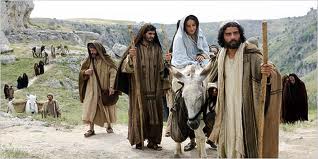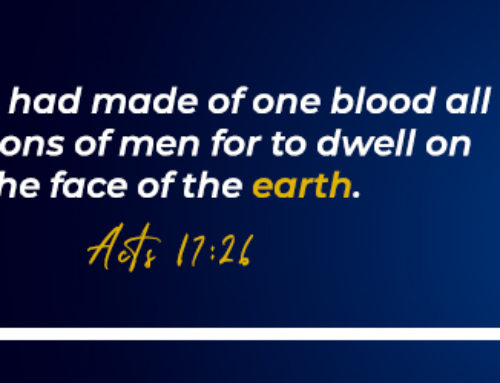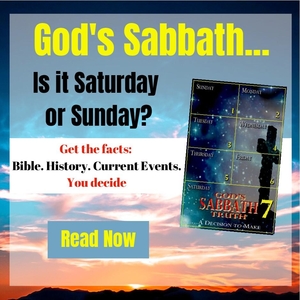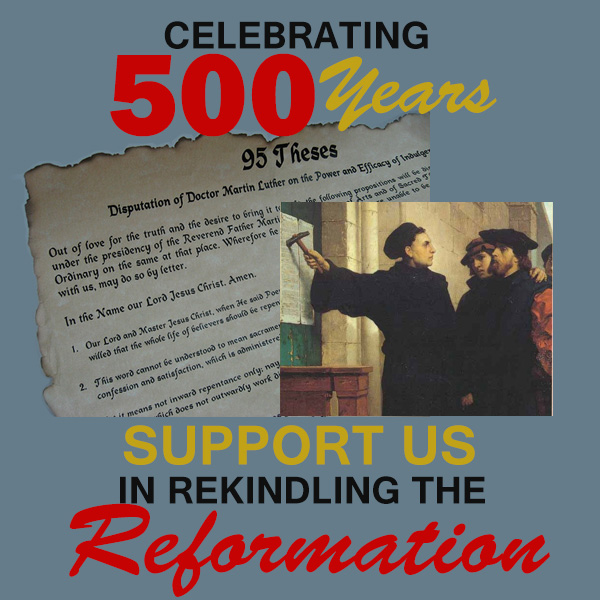But saved from what? The apostle Paul answers assuredly, “For the wages of sin is death; but the gift of God is eternal life through Jesus Christ, our Lord” (Romans 6:23). When God created man, His
Hence, John the Baptist, when he saw Jesus coming to him on the banks of the Jordan river, declared, “ Behold the Lamb of God which taketh away the sin of the world” (John 1:29). The angel likewise announced to the shepherds and to the world, “Fear not: for, behold, I bring you good tidings of great joy, which shall be to all people…for unto you is born in the city of David a Savior which is Christ the Lord” (Luke 2:10-11). The plan was announced to Joseph even before the shepherds were greeted with the good news. The angel comforted him, “And she [Mary his espoused wife] shall bring forth a son and thou shall call his name Jesus for He shall save His people from their sin” (Matthew 1:21).
The reason Jesus was born was to save humanity from the penalty of sin and restore him to image of God which was lost in Eden. But how does He do this? He does it first of all by giving us the Divine pattern which we should follow. The apostle Peter records, “For hereunto were ye called, because also suffered for us leaving us an example that we may follow His steps” (1Peter 2:21). By Jesus’ perfect, sinless life, God intends that all humanity, by His grace, would be transformed into His image-the image in which He originally made us and from which we have fallen. So the apostle Paul admonishes us, “But we all with open face beholding as in a glass, the glory of the Lord are changed into the same image, from glory to glory even as by the Spirit of the Lord” (2 Corinthians 3:18). He continues, “For God who commanded the light to shine out of darkness, hath shined in our hearts, to give the knowledge of the glory of God in the face of Jesus Christ” (2 Corinthians 4:6).
Secondly, Jesus saves us by taking our place on Calvary’s cross and dying in our stead. He did no sin and therefore did not deserve death. But because He loves us so much, He took upon Himself the penalty which we earned. By so doing, He gives us the opportunity to live with Him eternally. The apostle Paul again reminds us, “But God commandeth His love towards us, in that, while we were yet sinners, Christ died for us…For if, when we were enemies, we were reconciled to God by the death of His son, much more, being reconciled we shall be saved by His life” (Romans 5:8,10) He continues, “To wit, that God was in Christ reconciling the world unto Himself, not imputing their trespasses unto them; and have committed unto us the word reconciliation”(2 Corinthians 5:19).
Paul also tells of the time of His birth. Says he to saints at Galatia, “But when the fullness of time was come, God sent forth His Son born of a woman, made under the law…to redeem them that were under the law, that we might receive the adoption of sons” (Galatians 4: 4-5). Nothing more specific has been given to us about the time of the Savior’s birth. But today, the world is preparing to celebrate His birthday on December 25th.
Unfortunately, the reason for which He came is largely forgotten in the process. But how can this be? Historical evidence gives us some clues. Walter Woodburn Hyde, a church historian writes, “Remains of the struggle between the religion of Christianity and the religion of Mithraism are found in two institutions adopted from its rival by Christianity in the fourth century. The two Mithraic days: December 25th, Dies Natalis Solis, birthday of the sun as the birthday of Jesus; and Sunday, the venerable day of the sun, as Constantine called it in his edict of 321 AD”(Paganism to Christianity in the Roman Empire, page 60).
Today, millions of Christians celebrate December 25th as the birthday of Jesus Christ. This date and the honor given to it, by most Christians, has no Scriptural basis or Divine approval. It is a tradition of man, adopted by the church of the middle ages and handed down the world. Often we hear the assertion, “we know that December 25th is not the birthday of Jesus Christ, but…”. Whatever comes after the ‘but’ is immaterial. The apostle James warns us, “Therefore, to him that knoweth to do good and doeth it not, to him it is sin.” (James 4:17). Our Lord and Savior, the very one supposedly celebrated on December 25th, declares, “This people honoureth Me with their lips, but their heart is far from Me…Howbeit, in vain do they worship Me, teaching for doctrines the commandments of men” (Mark 7:6-7).
One cannot take that which God has condemned, and convert it to what He requires. December 25th, along with Sunday sacredness, stand out as the two greatest deceptions in Christendom today. Noted historian Arthur Weigall enlightens us, “The church made a sacred day of Sunday…largely because it was he weekly festival of the sun; for it was a definite Christian policy to take over the pagan festivals endeared to the people by tradition and give them Christian significance” (The Paganism in our Christianity, page 145).
The Christianized name for the pagan tradition of honoring the sun on December 25th is Christmas. It is a contraction of “Christ’s Mass”, derived from the Old English Cristes mæsse. It is often abbreviated Xmas, probably because X or Xt have often been used as a contraction for “Christ” (“X” resembles the the Greek letter X(Chi), the first letter of “Christ” in Greek (Χριστός [Christos]). The word itself is an oxymoron, a contradiction in terms. Christ is the Light of the world. He is truth and He is life. The ‘Mass’ is is a papal ritual performed by its priests who claim in the process to bring down Christ from heaven and crucify Him afresh every time the Mass is celebrated. But, the apostle Paul writes, “So Christ was ONCE offered to bear the sins of many; and unto them that look for Him shall He appear the second time without sin unto salvation” (Hebrews 9:28).
The Scripture does not tell us of the day Jesus was born; nor does God asks us to celebrate a day in honor of His birth. There is no record of the decorating of the evergreen tree, the use of mistletoe, exchanging of gifts one to the other nor Santa Claus. None of this can lead us to salvation, the purpose for which Jesus came. They are all adopted from pagan religions of old and passed on to God’s people by the Roman Catholic church. Christmas is perhaps her strongest wine (Isaiah 28:7; 29:9; Psalms 60:3; Revelation 17:2). The whole world has indeed been made drunken by it. By her association with the nations in this regard, December 25th has become the most commercially profitable enterprise known to man. The church and the nations, pretentiously in the name of Christ, look forward to this time, not with the need for a Savior; but rather with a yearning for personal and financial gain.
Thousands of years before the first advent of Jesus Christ, the pagan cultures of antiquity venerated December 25th and worshiped the mother/son icon which is now perceived as Mary holding her son, Jesus. This is a most powerful and emotional phenomenon. Have you ever stopped to think that though Jesus was born about two thousand years ago, He never grows up, but continues to be a babe in His mother’s arms? This imagery has nothing to do with our Savior’s birth and everything to do with the ancient cultist practice of mother/son worship. It permeates every pagan religion. In Egypt it was Isis with her son Horus. The Chinese venerate this image as Shing Moo and her son. To the Hindus, the icon is represented as Divaki, the mother and Krishna the son.
How can people go out and spend money that they do not have, placing themselves in financial bondage, all the while believing that they are honoring God? In what way do they praise Him by engaging in drunkenness and gluttony? How can you uplift the name of Jesus by partying and engaging in illicit sexual activity? But they say that He is the reason for the season. Where is He in all of this? At best, Christmas is popular culture. To mix it with the birth of Jesus Christ does not make it Christian. Neither Christ, the apostles, nor the early church engaged in or endorsed such a practice. Popular culture, innocent and fun-filled as it may seem, cannot save man. Only Jesus Christ can.
But what should the Christian do? Someone suggested that they put Christ back in Christmas. Well, He was never there to begin with. What they can do is to do what they should be doing throughout the year, i.e. loving, caring, giving, and telling others about Him, particularly His soon coming; not as a babe in a manger, but as Lord of Lords and King of Kings. It has also been said that Christmas draws attention to the name of Christ; but Christ declared, “And I, if I be lifted up from the earth will draw all men unto Me” (John 12:32).When Christians live like Christ, with or without Christmas, all men will know that they have a Savior whose name is Jesus Christ. As they study His word, pray, and follow His example in serving humanity, then the world will know that a Savior was born. They don’t need pagan accompaniments to reflect Jesus. Christ stands alone, apart from the traditions of men and the practices of the world. So should Christians.
The apostle Paul declares that for whatever reason the name of Christ is lifted up, Christians should rejoice (Philippians 1:18). However, they should be cognizant of the fact the foundation of Christmas is not Jesus, but sun worship. The birth of Jesus Christ has nothing to do with December 25th; but all to do with the transformation of our characters to be like Him. That’s why He came. The apostle Paul makes it clear, “And be not confirmed to this world, but be ye transformed by the renewing of your mind, that ye may prove what is that good, and acceptable, and perfect, will of God” ( Romans 12:2).
It is futile to suggest that one can ignore December 25th with all its worldly and pagan ramifications. Nevertheless, Christians should certainly rejoice that Jesus was born, and to whatever degree possible, celebrate the fact that His name is mentioned at this time of the year. May the Savior’s prayer be heeded by His people, “I pray not that thou shouldest take them out of the world, but that thou shouldest keep them from the evil. They are not of the world, even as I am not of the world (John 17:15-16).
Ultimately, the reason for which He came is to restore the image of God in man. The night before he was crucified, Jesus prayed,”That they all may be one; as thou, Father, art in me, and I in thee, that they also may be one in us: that the world may believe that thou hast sent me. And the glory which thou gavest me I have given them; that they may be one, even as we are one: I in them, and thou in me, that they may be made perfect in one; and that the world may know that thou hast sent me, and hast loved them, as thou hast loved Me” (John 17:21-23).










Leave A Comment